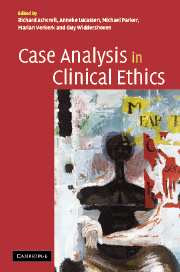Book contents
- Frontmatter
- Contents
- Notes on contributors
- Acknowledgements
- 1 Philosophical introduction: case analysis in clinical ethics
- 2 Families and genetic testing: the case of Jane and Phyllis
- 3 Family access to shared genetic information: an analysis of the narrative
- 4 A virtue-ethics approach
- 5 Interpretation and dialogue in hermeneutic ethics
- 6 ‘Power, corruption and lies’: ethics and power
- 7 Reading the genes
- 8 A utilitarian approach
- 9 A feminist care-ethics approach to genetics
- 10 A conversational approach to the ethics of genetic testing
- 11 Families and genetic testing: the case of Jane and Phyllis from a four-principles perspective
- 12 A phenomenological approach to bioethics
- 13 An empirical approach
- 14 Response to ethical dissections of the case
- 15 Philosophical reflections
- Index
- References
11 - Families and genetic testing: the case of Jane and Phyllis from a four-principles perspective
Published online by Cambridge University Press: 01 September 2009
- Frontmatter
- Contents
- Notes on contributors
- Acknowledgements
- 1 Philosophical introduction: case analysis in clinical ethics
- 2 Families and genetic testing: the case of Jane and Phyllis
- 3 Family access to shared genetic information: an analysis of the narrative
- 4 A virtue-ethics approach
- 5 Interpretation and dialogue in hermeneutic ethics
- 6 ‘Power, corruption and lies’: ethics and power
- 7 Reading the genes
- 8 A utilitarian approach
- 9 A feminist care-ethics approach to genetics
- 10 A conversational approach to the ethics of genetic testing
- 11 Families and genetic testing: the case of Jane and Phyllis from a four-principles perspective
- 12 A phenomenological approach to bioethics
- 13 An empirical approach
- 14 Response to ethical dissections of the case
- 15 Philosophical reflections
- Index
- References
Summary
The four-principles approach does not purport to resolve moral dilemmas!
The four-principles approach in bioethics (beneficence, non-maleficence, respect for autonomy and justice, in case any reader does not already know them – see Beauchamp and Childress 2001 and, for example, Gillon 1994) does not purport to solve moral dilemmas resulting from conflict between the principles and thus it has no canonical response to the moral dilemma(s) presented in the case of Jane and Phyllis. While there are several obvious moral issues raised in this case, and a large variety of others that could reasonably be extracted from it, the main moral dilemma is easy enough to specify. One limb argues reasonably that the confidentiality of Phyllis's medical record should be breached in the interests of providing potential medical benefit to Jane and possibly her daughters – this horn of the dilemma pricks morally because it breaches the moral norm of medical confidentiality. The other limb of the moral dilemma argues reasonably that the strong (even though not absolute) moral norm of respecting medical confidences should be honoured and Phyllis's medical information should therefore not, without her consent, be passed on to Jane – this horn pricks morally because Jane's health, and possibly that of her daughters, may unnecessarily and possibly severely be harmed as a result of the doctors not breaching medical confidentiality.
- Type
- Chapter
- Information
- Case Analysis in Clinical Ethics , pp. 165 - 186Publisher: Cambridge University PressPrint publication year: 2005
References
- 2
- Cited by



